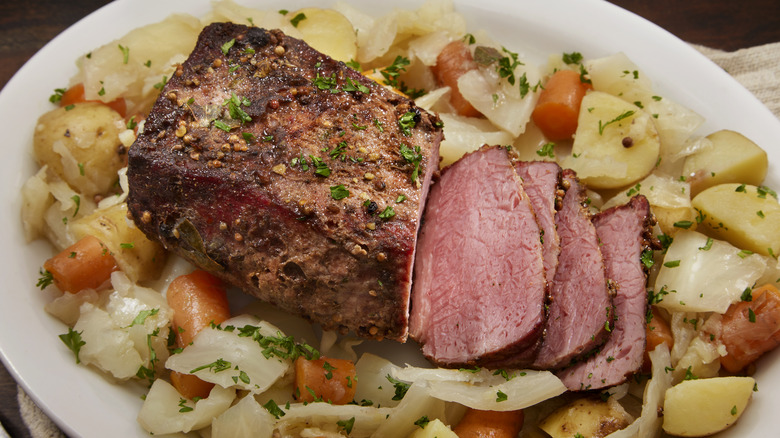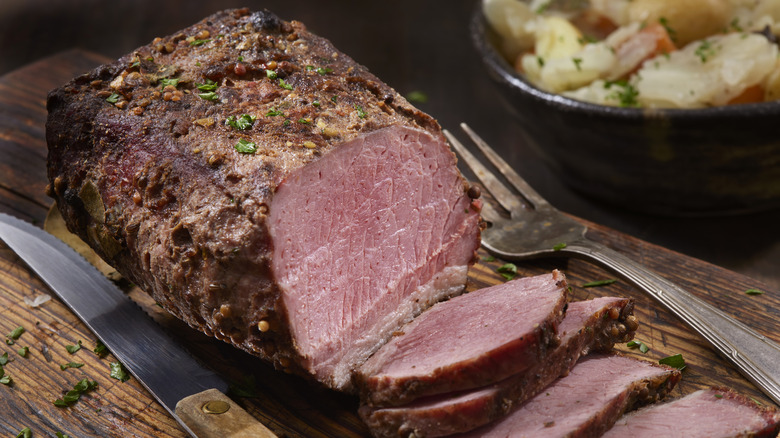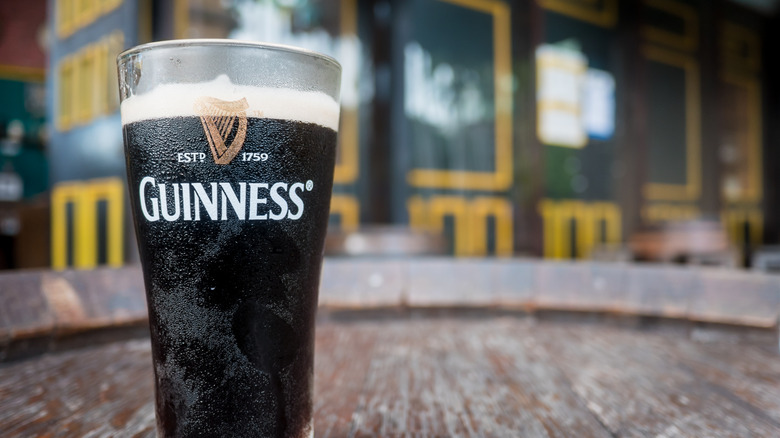Why The Irish Actually Don't Eat Corned Beef On St. Patrick's Day
The consumption of corned beef and cabbage is one of several St. Patrick's Day traditions that didn't actually originate in Ireland. Surprising as it may seem to those outside of the country, the United States started the trend of eating corned beef on the day honoring Ireland's primary patron saint. However, it was indeed Irish immigrants who began the tradition during the latter part of the 19th century.
In Ireland, bacon, cabbage, and potatoes are a classic meal to celebrate St. Patrick's Day. Immigrants living in the U.S. began eating corned beef instead when the price of bacon climbed up too high. This is not to say that corned beef has no place in Ireland. It has a long history in the country, dating back to the 17th century, when the nation was a prominent exporter of the salt-cured beef.
If American tourists happened to be in Ireland for St. Patrick's Day and wanted to celebrate with their go-to corned beef, they'd probably be able to find it (and also make the requisite morning-after corned beef hash). But corned beef has never been very popular among Irish citizens. In fact, as the national preference for bacon indicates, most of the population would rather eat pork. The reasons for this are complicated, as the country's Gaelic roots definitely play a part, as does Ireland's complex history with England.
Why corned beef never became a popular food in Ireland
Ireland's history provides explanations for its people's disdain for corned beef. Firstly, cows are considered a sacred animal associated with wealth in the Gaelic religion. Beef was a food reserved for royalty and the very wealthy. This is why pork was — and still is — so widely-consumed in the nation.
Ireland became a major producer and exporter of beef in the 17th century, after England, its colonizer, set it up to do so. Beef became a symbol of English aristocracy and industrialization. Following a pair of "Cattle Acts" that banned exports of Irish beef to England, the nation needed new international markets for its cows. Ireland's low tax tariffs on salt allowed the country to import it cheaply, and combined with their large supply of cattle, corned beef could be churned out in huge supply. Ireland became the preeminent corned beef exporter for the Atlantic trade, supplying the stuff to both Europe and the Americas.
All this business didn't translate to popularity for the dish, however. The Irish themselves never developed the habit of eating beef, as it was still too expensive for most people. Pork remained the staple meat, if families could afford it at all. The heyday of the corned beef trade ended in the 18th century, and starting in 1845, Ireland experienced a devastating famine. The Great Famine, as it is known, was the impetus for large-scale immigration to the U.S. and Canada.
What foods do the Irish eat to celebrate St. Patrick's Day?
The Irish don't eat corned beef for St. Patrick's Day, and they don't drink beer dyed a bright green, either. The latter tradition began in Savannah, Georgia in 1961, but soon became more associated with St. Paddy's celebrations in Chicago. No one in Ireland is ordering an Irish car bomb cocktail, either, as that name is considered offensive for yet more historical reasons (the drink has since been renamed the Irish shot).
So what do the Irish like to eat and drink for their national holiday, besides bacon, cabbage, and potatoes? Stews, both of the beef and lamb variety, are quite popular in the country, and are typically served with colcannon, a mash-up of cabbage and buttery mashed potatoes. Irish soda bread and dessert options like chocolate butter pastry pies are also commonly featured on family tables for St. Patrick's Day.
A pint of Guinness stout (with its surprisingly few calories) is the preferred drink, and it remains its natural dark brown color. However, the whole "green beer" practice isn't as shunned in Ireland as one may think. In 2020, Dublin planned to dye the River Liffey green for St. Patrick's Day as a nod to Chicago, but Covid-19 pandemic conditions ultimately cancelled any public festivities. Perhaps in the future, we'll see the Irish capital embrace American St. Paddy's traditions in other ways.



